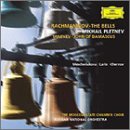| All Artists: Sergey Rachmaninov, Sergey Taneyev, Mikhail Pletnev, Vladimir Chernov, Sergej Larin, Russian National Orchestra Title: Rachmaninov - The Bells ~ Taneyev - John of Damascus / Chernov, Larin, Pletnev Members Wishing: 0 Total Copies: 0 Label: Dg Imports Release Date: 4/2/2001 Album Type: Import Genre: Classical Styles: Opera & Classical Vocal, Symphonies Number of Discs: 1 SwapaCD Credits: 1 UPC: 028947102922 |
Search - Sergey Rachmaninov, Sergey Taneyev, Mikhail Pletnev :: Rachmaninov - The Bells ~ Taneyev - John of Damascus / Chernov, Larin, Pletnev
 | Sergey Rachmaninov, Sergey Taneyev, Mikhail Pletnev Rachmaninov - The Bells ~ Taneyev - John of Damascus / Chernov, Larin, Pletnev Genre: Classical
Rachmaninov allegedly considered The Bells to be his best work, and it is not difficult to hear why. Written in 1913, it has a freshness of invention that is irresistible. Perhaps the text (an adaptation of an Edgar Allan ... more » |
Larger Image |
CD DetailsSynopsis
Amazon.com Rachmaninov allegedly considered The Bells to be his best work, and it is not difficult to hear why. Written in 1913, it has a freshness of invention that is irresistible. Perhaps the text (an adaptation of an Edgar Allan Poe poem) struck a chord with this composer's sensibilities: different bells symbolize different facets of existence. The piece deserves more frequent airing, and it is to be hoped that Mikhail Pletnev and his Russian forces help raise awareness of it. The soloists are superb (Mescheriakova is particularly impressive), but the real star is the Moscow State Chamber Choir. This is a worthy companion to Pletnev's accounts of Rachmaninov orchestral works. Also included is a piece by Sergei Taneyev, a composer who should be more widely appreciated. Too often castigated in the textbooks for being overly academic, his works nevertheless demonstrate a creative originality that has immediate appeal. The cantata John of Damascus is something of a find. The Russian National Orchestra creates a superbly chilly atmosphere in the first movement, and once again the choir triumphs with fervent singing that conveys belief in the quality of this music. The Bells ranks as a fine modern performance, but the Taneyev might prove even more fascinating. --Colin Clarke Similarly Requested CDs
|
CD ReviewsRachmaninovs greatest work 04/22/2002 (5 out of 5 stars) "This is an extraordanary album.Pletnev, orchestra, choir, singers and soundengineers gives you a wonderful, enjoyable moment listening to this masterpiece.It starts like a happy birth with joyful cheerish song and ends up... well it is done after a poem by Edgar Allan Poe so... but anyway... if you like russian singing at its BEST and a GREAT piece dont hesitate to buy this and the filler...... Taneyev is more than a filler and by that I mean it is VERY good" Five stars are not enough Penhoet | Nova Scotia Canada | 07/03/2004 (5 out of 5 stars) "For some reason I didn't listen to this disc for a very long time after receiving it but once I started listening I could not stop. Whether this music is typical Rakhmaninov or atypical I cannot say. There are some aspects of the harmony and orchestration that are Rakhmaninov trademarks but it's hard to say whether one could listen to the music without knowing who wrote it and immediately guess that it was Rakhmaninov. Perhaps it's because Rakhmaninov is best known for his piano and orchestral works that the choral aspect throws one off the scent. In any case, this is one of Rakhmaninov's most beautiful and moving works. You don't have to know Russian to appreciate it though it does help; the inclusion of the transliterated text allows you to follow along phonetically if you wish though I would also have appreciated the original Cyrillic text. The mood and orchestral colour clearly transmit the atmosphere of each movement, whether that be the rushing of the sleighs, the panic of the alarm bells, or the gloom of the funeral bells. I'm tempted to ask why this work is not in the standard repertoire but it's pretty obvious that the Russian text makes it less accessible to Western singers and audiences. Still, this is unquestionably one of the greatest works of the 20th Century and should be more often played. Magnificent recording!" The darkness of "John of Damascus" is on to me... Eric S. Kim | Southern California | 12/30/2005 (5 out of 5 stars) "When I heard the first thirty seconds of Sergei Taneyev's John of Damascus, I was hooked. It is such a dark and melodic piece from a man who certainly needs to be more well-known than Tchaikovsky. The overall power and emotion of this "Russian Requiem" is quite powerful and magnificient, and the third (final) movement is both exciting and tragic at the same time.
I agree with those who believe that "John of Damascus" is more than just a filler (Yes, The Bells by Rachmaninov is certainly fabulous here). Pletnev knows how to deal with a dark cantata like this; the orchestra and choir give all their might in just twenty-two minutes. All in all, both Rachmaninov and Taneyev have equal importance here. But buy this CD especially for Damascus." |

 Track Listings (7) - Disc #1
Track Listings (7) - Disc #1








